#Free Buryatia
Explore tagged Tumblr posts
Text
From : https://x.com/Gerashchenko_en/status/1783417093079081428 on Twitter
"Marina Khankhalaeva, representative of Buryatia Independence Committee. She spoke at United Nations Permanent Forum on Indigenous Issues."
On the exploitation of Russian indigenous groups
#Russia#Russian imperialism#russian colonialism#Buryatia#Tuva#Free Buryatia#indigenous russia#Indigenous Russians#Ukraine#russian invasion#russian invasion of ukraine
294 notes
·
View notes
Text

[ID: Tucker Carlson, the man that inverviewed Putin, tried on a Buryat "Dagel" costume at the Russia exhibition, said the Republic of Buryatya head Alexey Tsydenov. Acocording to him, the journalist visited the republic's stand on February 5. Buryats are an indigenous people of Eastern Siberia in Russia. End ID]
Why on Earth did he think this is a good idea!?
1 note
·
View note
Note
Your art so surreal, did you take inspiration from African masks it’s amazing. You have probably gotten this question before but what’s your process and how do plan these beautiful pieces out. I am a beginner artist and would like some advice on how start doing digital painting.
thank you for bringing me back from the dead with your kindness, (i was so sad today ughhhh i think watching vampire diaries starting to affect me hjkhjk), i really, really deeply thankful that you spend your time to write something so sweet (also sorry it took me literally ages to reply phphp THE USUAL)
yeah, in buryatia shamanism like the big thing, so when i went to search what's out there in the masks department - google's mess of the results for once was helpful and showed this massive collection of beautiful african masks. the one that was inspo for tiisha lived in my head rent free for weeks before the character was even born phphph now i cant even imagine her without it
(here is little tiisha for you before i'll proceed to be not helpfull phphphph)

oof advices are not my strong side , like..........my process mostly is just sleep through the whole thing i guess..........................i very rarely do sketches, i hate study anatomy and perspective, drawing cubes makes me physically sick etc etc my approach to drawing were "fuck around and find out", always about chill and fun and barely ever about learning. imho thats why im so shitty at drawing simple things but not bad at coloring. so yeah, my biggest advice always and forever will be - be gentle to yourself, please
digital or traditional or whatever else is out there, dont forget you make it for yourself and for yourself only okay? it supposed to be fun, not sad tiring and competitive
advices for digital specifically tho - very objective, apply with caution
learn all the keyboard shortcuts, ideally to press them without thinking
explore more instruments than just brush. it will be tedious and sometimes feel like a chore so mb pick one victim once a month and browse youtube for a stuff like SECRET ULTIMATE TIPS ABOUT MAGIC WAND TOOL THAT WILL SAVE YOUR LIFE (they indeed will save your life)
check if your drawing program has artboards - turning it on will give you more freedom over canvas positioning and your refs will always be there and not in the separate window
idk about others but using auto tone, auto contrast and auto color often gives me well needed perspective on what im doing
in 99% cases be sure that you can reanimate even the most messiest artpiece you ever did. working in digital gives you the chance to mess with shapes, colors and perspective at any time so if you dont want to gave up on something - you absolutely didnt have to
from time to time while you are still learning - go out there in the wilds and search for the new brushes. tweak with them if you want. i have like ~500 and i use 6 max, but those 6 i found by at some point trying to draw with all of the 500
MADE. BACK UPS. and i mean not like save layers just in case before merging them (tho that's too will help) no, i mean click SAVE AS once an hour and create A NEW FILE. PLEASE. i lost so much stuff to sudden power outage. its never pretty and you loosing will to work for days
watch at least one tutorial about the whole rgb srgb and cmyk thing - i did, understood not a thing, but at least im not playing dora the explorer with my colors after the export now
uh idk think thats it? tried to think about those that id hope i knew when i started so hopefully something will help
have fun with your drawings!!
62 notes
·
View notes
Text
Decided to draw the OC's of the THSC community on Tumblr as characters from the TNO universe (THSC x TNO)
I drew the oc's present in the post based on the artstyle of each blog (or at least how I interpret it) and the theme I gave to each oc. Hope ya'll like and enjoy it. I'll probably draw a second batch of THSC oc's x TNO art if I can find any oc that I can draw, if you want to be included then just dm me (or don't).
@yunaisky 's Andy Postman and Frederick Cedric x The Red Poppy Movement

"The Tyrant-Fighting Boyfriends of Roue"
@bluetorchsky 's Accordion and Violin x The Humanist

"The Music Dragons of Shostakovich"
@rarestdoge, @smoresthehalloweenqueen, and @mai-mai-lim 's ABC Trio x Siberian Black Army

"Be Gay, Do Crime!"
@caruskie 's Carus x Free Aviators
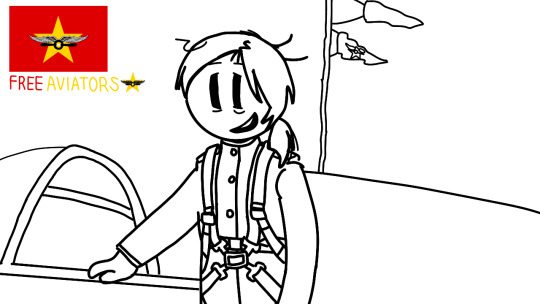
"The Witch of the Urals"
@capturecharlesau 's Danny Felizima x Governorate of the Levant

"Capitano Luce Stellare del Levante (Captain Starlight of the Levant)"
@ceresfromnationstates 's Calvin Perez x South African War (US Inteevention)
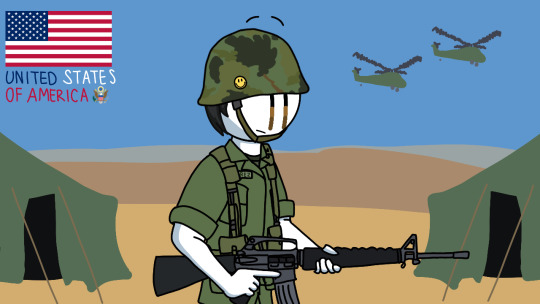
"GOOOOOOOOOOOOOD MORNING SOUTH AFRICA!!!!!!!!!"
@m1mk1d 's Max and @itz-candikin 's Lexi x Buryatia

"Le Holesom Mutineers of Sablin"
(Tbh I had fun drawing all of these, will look forward in making a project like this)
#the henry stickmin collection#thsc#henry stickmin collection#thsc au#thsc art#thsc fandom#thsc fanart#tno#the new order: last days of europe#the new order#andy postman#frederick cedrick#thsc andy#thsc frederick#thsc violin#thsc accordion#abc trio#ashley jang#brutus dan gerbreaker#cameron calvin#danny felizima#calvin perez#thsc calvin perez#lexi mary#thsc oc#henry stickmin oc
36 notes
·
View notes
Text
League of Free Nations: Indigenous activists from Russia to fight for independence from Moscow

Kalmyks in Elista, Republic of Kalmykia. Source: Wikipedia
2022/05/24 - 00:00 • INTERNATIONAL, RUSSIA, RUSSIAN AGGRESSION
Article by: Christine Chraibi
Indigenous activists from Russia, representing six national movements, have announced the creation of the League of Free Nations– a political platform for the decolonization of indigenous peoples in the Russian Federation and the acquisition of each nation’s sovereignty.
With the outbreak of the Russo-Ukrainian war on 24 February, 2022, many Russian citizens of indigenous nations have been wittingly or unwittingly drawn into the ranks of the Russian army. However, most are there because they are trying to escape the horrible poverty they experience at home and see the military as the best or in many cases only way to improve their sorry lives.
Indigenous peoples have been under the Russian yoke for centuries
Back in April 2021, Sires Bolaen (Syres Boliayen), Inyazor (Chief Elder) of the Erzya people, addressed the 20thsession of the UN Permanent Forum on Indigenous Issues, drawing attention to the Kremlin’s policy of purposeful neglect and discrimination of indigenous people.
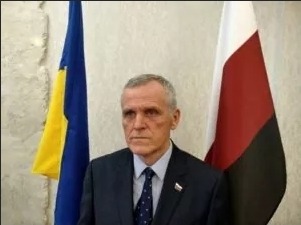
Sires Bolaen (Syres Boliayen), Inyazor (Chief Elder) of the Erzya people. Photo: open source
“Within the past 30 years, the Ezrya have been turned from a nation of a few million people into a small ethnic group on the brink of complete extinction.
Our neighbours in the Idel-Ural region – Mokshans, Udmurts, Maris, Chuvashs, Bashkirs and even Tatarsalso find themselves in a very similar position. Native peoples in Russia are forbidden to have their own political parties, or even to study their mother tongue in secondary schools. Only dancing in national costumes is tolerated. Those who stand up for their rights are persecuted as extremists and become victims of punitive psychiatry.”
The leader of the Erzya national movement is known not only for his anti-imperialist stance, but also for leading a group of Erzya volunteers fighting with the Ukrainian army. He is the co-founder of the Free Idel-Ural movement,which advocates the withdrawal of six Volga republics (Bashkortostan, Tatarstan, Chuvashia, Mordovia, Mary El and Udmurtia) from the Russian Federation and the creation of the Idel-Ural confederation.
In May 2022, Sires Bolaen once again addressed the UN Permanent Forum on Indigenous People during its 21stsession. He publicly condemned and blamed Moscow for turning federal republics and indigenous communities in Russia into socially backward and under-developed regions where local young people seek to escape poverty by joining the Russian Armed Forces.
North Ossetia, Buryatia, Tuva, Dagestan, Ingushetia, Chukotka and Idel-Ural are the regions with the highest number of dead soldiers per thousand population, he says.
Indigenous peoples gather in the League of Free Nations
In order to draw attention to the dire situation facing the indigenous people of Russia,Bashkir, Buryat, Ingush, Kalmyk, Erzya and Adyghe activistsdecided to set up a new organization – the League of Free Nations – and proceeded to issue a public announcement.
“These past few weeks, various media have been writing and talking more about the future of the Russian Federation after the Russian-Ukrainian war.
First of all, these discussions do not concern the organization of the federal subjects of the Russian Federation, but look more towards the paradigm ‘the future of the federal center is the future of Russia’.”reads the statement.
Vladimir Dovdanov, member of the Oirat-Kalmyk People’s Congressunderlines that his people have been experiencing colossal demographic catastrophes for centuries.

Vladimir Dovdanov, member of the Oirat-Kalmyk People’s Congress. Photo: Idel Realii (RFE/RL)
“…This is due to the fact that we’ve always been treated as a colony ruled by a tsar. Later [during the Soviet period-Ed], the different general secretaries used the Kalmyksas disposable objects. Today, as a result of Russia’s military aggression against Ukraine, major global political changes are taking place, and this gives us the opportunity to become a subject state, and no longer be treated as an object. I see that many other peoples in the Russian Federation have the same desire.”
In their manifesto, the indigenous leaders proclaim the principle of “presumption of subjectivity/agency”, according to which the regions do not need to appeal to anyone to grant them sovereignty in the event of the collapse of the current political regime in the Russian Federation,.
All regions, by definition, can achieve and declare full sovereignty and full independence from Moscow. Then, acting as free territories, they can decide their own future: whether they want to remain independent, unite with other regions/republics, or create a confederation of states.
Sires Bolaen, Inyazor (Chief Elder) of the Erzya peopleassures that the League of Free Nations is open to new members and invites all those who share anti-imperialist views and recognize the right of peoples to self-determination to join the organization.
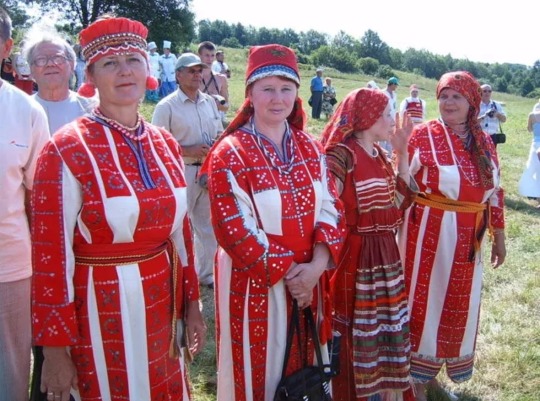
Erzya women from Penza Oblast dressed in traditional clothes. Source: Wikipedia
Activists of the Buryat national movement Dorjo Dugarov and Rajana Dugar-De Ponte, who co-founded the platform, believe that uniting different national movements around the struggle for freedom and political subjectivity will have a cumulative effect – in particular, open new opportunities for the members to convey their ideas on different international platforms.
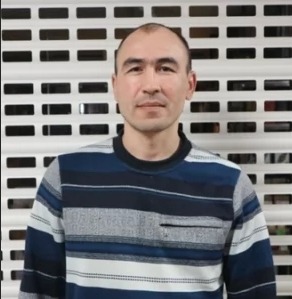
Activist Ruslan Gabbasov from Russia’s Republic of Bashkortostan. Photo: Idel Realii
Activist Ruslan Gabbasov from Russia’s Republic of Bashkortostan, who fled Russia in December 2021 fearing for his safety and obtained political asylum in Lithuania, is a representative of the Bashkir national movement.
“I believe that all constituent subjects, as well as all indigenous peoples of the Russian Federation have the right to participate in the discussion on the future of Russian territories and to exercise their right to self-determination,”said Gabbasov .
The initiators of the League of Free Nations are as follows:
Vladimir Dovdanov, Batyr Bormongaev, Erenzen Doliaev(Kalmyks, Republic of Ralmykia)
Ruslan Gabbasov(Bashkir, Republic of Bashkortostan)
Sires Bolen and Vitaliy Romashkin(Erzyas, one of the peoples of the Republic of Mordovia)
Dorjo Dugarov, Rajana Dugar-De Ponte(Buryats, Republic of Buryatia)
Today, the members of the League of Free Nations call for the establishment of direct contacts with European, Turkish and Kazakh public organizations and political parties.
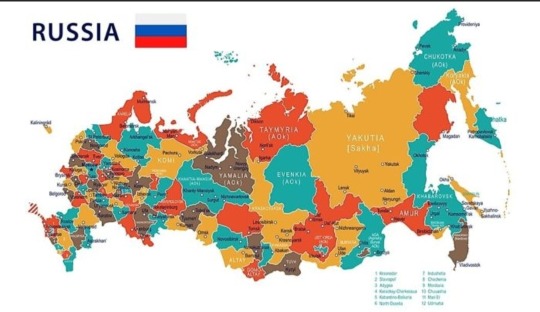
Administrative mao of the Russian Federation. Photo: World Atlas
Editor’s Note
Background
According to its constitution, the Russian Federation is divided into 85 federal subjects, 22 of which are republics. Republics are administrative divisions originally created as nation states to represent areas of non-Russian ethnicity. The indigenous ethnic group that gives its name to the republic is referred to as the titular nationality. However, due to decades of Russian migration, each nationality is not necessarily a majority of a republic’s population.
During his long years in power, Vladimir Putin has launched several centralization reforms which steadily eradicated all autonomy the republics had, with the exception of Chechnya. All bilateral agreements were abolished and in practice all power rests with the central federal government.
In fact, some experts believe that Russia has ceased to be a federation.
#indigenous#culture#indigenous russia#indigenous russian#russia#important#fypシ#colonization#fypage#landback#siberian indigenous#indigenous siberian#siberian#siberia#indigenous rights#indigenous people#freenations#League of Free Nations#russian imperialism
73 notes
·
View notes
Text
The Russian authorities have designated a Ukrainian meme as a terrorist organization. On Tuesday, the news outlet Fonar reported that the Federal Security Service has identified the “Belgorod People’s Republic” as a subdivision of the Forum of Free States of Post-Russia, which Russia’s Supreme Court banned last November. The “BPR” emerged online as a joke after Russian officials in Belgorod started reporting Ukrainian artillery strikes and cross-border raids in 2022. The meme plays on the so-called “people’s republics” in Donetsk and Luhansk, the two proxy entities Russia sustained in eastern Ukraine after 2014 and later annexed outright.
In August 2022, during a live town hall with Belgorod Governor Vyacheslav Gladkov, one resident mentioned being frightened by rumors about the creation of a “Belgorod People’s Republic.” The governor assured the man that this information was false, saying, “You’re reading the wrong sites.” Gladkov encouraged his audience to stick with “official information” or “data from other channels.”
In November 2024, the Russian Supreme Court ruled that the Forum of Free States of Post-Russia and its 172 “structural subdivisions” are terrorist organizations. In early January 2025, the FSB published a list of these subdivisions, which include the foundations “Asians of Russia,” “Free Buryatia,” “Free Yakutia,” “League of Free Nations,” “Free Idel-Ural,” and others.
2 notes
·
View notes
Note
Hi,
I'm not indigenous so you can dismiss this as being overstepping if you want and you'd have every right to as a native person. I was thinking of maybe sending this on anon but anon messages are far easier to be construed as bad faith (I want to stress I'm not sending you this ask to dunk on you or ague with you or something) and also I think it's best to be honest so I'm doing this off anon.
I'll admit I was personally kind of uncomfortable at your Koryak Russia headcanon when I saw it, particularly because of the history regarding the Russian colonisation of Siberia, and especially because you chose the Koryaks in particular. However I am not indigenous so of course my opinion is definitely not one which should be amplified. I just want to give some context on Siberia/the Koryaks which might help explain further why the Koryak anon was upset.
Unlike the USA, Russia was an already established country when it undertook its colonisation of the far East. The indigenous Siberians were never originally "Russian" and had very little to no contact with Russians before the Russians invaded, and, again, Russia was an already established country at that point. The formation of Russia as a nation had nothing to do with engaging with Siberian indigenous, however Russia as we know it today with its huge landmass is a result of the later Russian colonisation of Siberia (Tsardom of Russia established 1547, Russia began its invasion of Siberia in 1580).
I didn't want to say anything because well I'm not a Koryak nor am I am indigenous Siberian nor am I indigenous at all however seeing as a Koryak spoke out, I just wanted to give a little more context of Russia's treatment of Siberian indigenous and Koryaks in particular. Again, I'm not sending this ask to shout at you, I just wanted to give further context.
Russia, as the previous Koryak anon pointed out, has been disproportionately mobilising indigenous Siberians, hence why the "Free Buryatia Foundation" was founded in an attempt to combat this, I've made some posts on this myself, including the recent Russian crack down on Siberian activists in which they've sentenced the leader of Free Buryatia to 7 years in prison.
Indigenous Siberian soldiers in Ukraine have also been frequently scapegoated for Russian war crimes committed in Ukraine, including by the Pope himself,
"The cruelest are perhaps those who are of Russia but are not of the Russian tradition, such as the Chechens, the Buryats and so on,” he said."
https://www.google.com/amp/s/amp.cnn.com/cnn/2022/11/29/europe/pope-francis-chechens-buryats-intl/index.html
Not only do indigenous Siberians face Russification, grapple with the Kremlins mistreatment of them and suffer from disproportionate mobilisation, but they are also being scapegoated for the brunt of Russian war crimes in Ukraine
https://www.media-diversity.org/the-savage-warriors-of-siberia-how-an-ethnic-minority-in-russia-came-to-be-unfairly-blamed-for-the-worst-war-crimes-in-ukraine/
To give some further context on Russia's treatment of the Koryaks in particular, not the full history but:
In the 1930s Koryak children were sent to boarding schools, where they were expected to adopt new ideas, including anti-religious views and criticisms towards their own traditions. This led to the loss of their natural way of life and traditions, with many Koryak settlements forcibly disbanded. In 1954, the teaching of the Koryak language was banned - this lasted for 2 decades. Affluent herders and shamans were executed during Stalins reign.
I can only find one source which says this so take it with a grain of salt , but nuclear testing. Apparently nuclear tests in the 1950s and 1960s caused severe problems for the Koryaks. Radioactive contamination harmed their immune system. Reindeer-herders' bones contain significantly more lead and caesium, resulting in a surge in diseases. Again, I could only find 1 source for this which is why I said "apparently" however regardless of if this factoid in particular is true or false doesn't necessarily take away from Russia's overall mistreatment of them.
On the Koryak infant mortality rate: "Infant mortality is also very high..The highest rates recorded in official statistics are among the Koryak, at 52.6 per 1000" (Peoples of the Arctic: Characteristics of Human Populations Relevant to Pollution Issues)
The average Koryak lifespan at one point was less than 50 years and iirc it's still quite low.
When it comes to their fishing:
"In September 2014, the parliamentary assembly of Kamchatka Krai introduced a bill aimed at reconsidering the management of those territories that have been traditionally used by indigenous peoples. The bill set out a proposal to considerably reduce their area and to prevent indigenous peoples from cultivating the land in the south of the Kamchatka Krai region – a move that deprives many of the ability to maintain traditional livelihoods such as fishing."
https://minorityrights.org/minorities/koryaks/
I'm not trying to point a finger at you because I'm sure you did not have any bad intentions with your post especially because you yourself are native and I'm not so I would be seriously overstepping, and of course it's always amazing to see more indigenous rep and I myself have my own Siberian ocs, but I just wanted to try and give some further context as to why perhaps the Koryak anon was upset at your depiction, however again I'm not indigenous so my opinion on the matter holds a hell of a lot of less weight. You don't have to feel obligated to post this, I know it's a heavy subject, and again I'm not indigenous/native so you could just dismiss this all if you wish. I hope this didn't come across as me overstepping
I truly appreciate your taking the time to message me. I do not mind, as anyone who recognizes something is wrong should say something. Being native does not excuse my choices, so please don't feel bad for correcting me or adding context.
I mentioned my intentions in the anon's ask because I wanted them to know my making Russia Koryaki was not to erase these humanitarian injustices, but to see a character I adore as indigenous. No matter my intentions, I should have known better than to connect an oppressed native culture that I have no connection to, to the literal embodiment of its invader.
Your message is important to me and because you used multiple sources, I do want to share it as it is a great way for more people outside of Russia to know about the plight of Koryak people. To the anon, I altruistically apologize for my depictions.
10 notes
·
View notes
Note
FREE TIBET! INDEPENDENCE FOR SIBERIA! FREE HONG KONG! INDEPENDENCE FOR GREENLAND! REPRESENTATION FOR THE NAVAJO NATION! BLACK HILLS LAND BACK! STATEHOOD FOR PUERTO RICO AND DC! INDEPENDENCE FOR INNER MONGOLIA! FREE KURDISTAN! INDEPENDENCE FOR ASSYRIA! FREE BALOCHISTAN! FREE BURYATIA! FREE BALI! FREE OKINAWA! FREE TAIWAN! #PayAttentionToTheWorldYouAreLivingIn 🌎 🌍 🌏
WOOHOOOO!!!!!
6 notes
·
View notes
Note
Hello. I've been following you for a while and I know that you organize fundraisers to help those in need. That's why I want to ask. What is happening to Buryatia and why did you decide to help this particular republic?
Hello! Thank you for following me! <3
Before I start, sorry if my English is not the best. I'm still learning and improving. If you don't understand something I wrote, please ask me in the comments and I will clarify.
Yes, for now I'm cooperating for a fundraiser for Maria. Her mom is going through cancer treatment and the situation is not the best.
On the other hand, I also shared a fundraiser (which is not organized by me) from Free Buryatia.
Free Buryatia is an organization created in 2022 to help those who were against the Russian-Ukraine war. This foundation speaks about the systematic abuse the Buryats are experiencing during this war, as they are the minority which death toll is the highest in all the Russian Federation.
I must say other minorities are also in a similar situation. Tuvans, Yakuts, Dagestanis... all the minorities (and ethnic russians from rural places as well) are being drafted in mass to the frontlines, while the muscovites are not.
Also, the drafted men sometimes need to buy their own equipment, as the equipment given by the army is not enough for facing the harsh winter, or secure enough. This means only those who can afford to pay for their own weapons, boots and everything will survive. And who are those that can afford it? The muscovites....
Of course a lot of them have tried to fee away from the Russian Federation (a lot are right now in Mongolia and Kazakhstan, for example) but others are facing trials for trying to escape. Free Buryatia provides lawyers for them, and they have also done a great work by sharing everything that is happening with us.
Sorry for the long post! If you want to know more you can DM me. I don't bite :)
If you want to read more/donate, here is their website:
Here is an useful article as well:
#buryatia#russian imperialism#ukraine#russian ukraine war#special military operation#siberia#indigenous russia
2 notes
·
View notes
Text
0 notes
Link
1 note
·
View note
Text
Just saying seeing Tucker Carlson in Buryat traditional clothing as someone sort of PR bullshit on Russia's part knowing that Russia has been throwing Buryats into the fucking jaws of death is pretty. Disgusting.
15 notes
·
View notes
Text
Thank you for this response. Tbh, I preferred to ignore them because they clearly misunderstand what systemic racism and abuse means. It does not mean that Indigenous recruits in the Russian army are some type of saints or martyrs, no - and unfortunately, many of them commit or may commit war crimes too. Native and Black soldiers in the American army, e.g. during the war in Vietnam also did many unspeakable things. The point is not to justify their wrongdoings, or even straight-out war crimes. The point is to explain what put them in this situation in the first place. And it is a system created by their colonizers.
Because, like, ask yourselves: what interest does a Sakha, Buryat or a Dagestani have to fight in Russian invasion of Ukraine? Exactly, none. Ukraine, especially as a state, has not abused their rights to their land, culture, language, heritage. The only reason why they are there is Russia’s colonial interest.
Another point is: how does this recruitment deny the abuse of Indigenous people in Russia? Because, at least from my perspective, this increased recruitment does not deny this abuse, even more, it is a perfect example of it. White Ivans from Moscow whine about how they have to flee their country because of the risk of recruitment while Muscovians, particularly white Muscovians, are literally the least recruited group. Meanwhile, Indigenous recruits are promised salaries that they could only dream of in normal circumstances - because their regions, the imperial periphery, are systematically underdeveloped.
Just as I said before, my aim is not to justify the potential war crimes also committed by Indigenous soldiers in the Russian army, but I had a chance to read a small investigation into some of these men made by Free Buryatia Foundation. I do vividly remember details in some of them. A son of a mother bedridden by cancer and an elderly father whose monthly annuity barely allows them to make ends meet; hoped to earn enough money for his mother’s chemotherapy. A father of five who needed to provide money for his family, as again, he and his wife could barely make ends meet. Et cetera, et cetera…
This is exactly the epitome of the pathology of this system. No one in normal circumstances, in a more stable country that at least cares a little about its people, would need to go to a fxxcking war, let alone a colonial one, to help their situation.
And what does Russia do when facing such systemic issues like underdevelopment and poverty? No, of course not implementing developmental policies, that would hurt the class of oligarchs and the Kremlin buttlickers too much. They would offer the poorest a chance to die in their colonial war, and once they die, strip them of their agency and independence even more, by adding them to the pile of martyrs dead for the imperial cause.
Because that’s what colonial empires have been always doing. And Russia is one of them.
The fact that there are the so-called “anti-imperialists” and “leftists” out there, who do zero research on the situation of the Indigenous people in Russia and then dare say that Indigenous activists like Yana Tannagasheva are neo-liberal American spies, just because they received de@th threats from the FSB just for fighting for their basic rights, is just appalling.
Like, a literal gen0cide of hundreds of nations, cultures and languages is funny to them. The same thing that happened to the Indigenous people in the Americas is funny to them, because it is not being done by the US. This is the real face of a large portion of leftist internet activism, or so it seems. What is leftist in cheering for people being illegally drafted and killed for a colonial empire’s war?
Like, WTF is wrong with those people.
#russian colonialism#russian imperialism#russia#ukraine#indigenous russia#indigenous people#indigenous people of Russia#russian invasion of ukraine#buryatia#yakutia#sakha#dagestan#chechnya#ichkeria#and many more#indigenous rights#victim blaming
234 notes
·
View notes
Text
September 25th, 2022
The cries for help of Russia's national minorities: "We will stop existing"
"In small villages, with two or three streets, they have taken all the men" • Putin's draft mobilization punishes regions like Yakutia, Buryatia and Dagestan.
On the day after declaring partial mobilization in Russia, a member of the Duma [Russian Parliament] and ex-mayor of Jakutsk, in Siberia, protested that the number of reserves that each region has to send to the front [of the war in Ukraine] didn't match. She asked why regions like Novosibirsk only mobilize 0.27% of the men between ages 20 and 59 and, at the same time, Yakutia has to mobilize 1.66%. In addition, she added, why are precisely the most disadvantaged towns of the north of Yakutia where the proportion of men called to war is higher? "In villages of the Artic, with 300 inhabitants, they take 47 men. I know what it means to live in the north at -55°C [-67°F] and, without the men, families will have a very hard time. What is the logic behind these numbers? What kind of proportionality are we talking about?"
Yakutia, located north of the permafrost and almost 8,500 km away from Moscow, is a land rich in natural resources (diamonds, uranium, hydrocarbon...) and the immigration of workers for the extraction businesses has left Yakuts and Evens, the indigenous peoples, as a minority in the cities of the centre and south of the Republic. On the other hand, they are the majority in the towns of the north, from which they are now being sent en masse to the frontline.
We have talked to Aanis, a girl from a town of 500 inhabitants where 35 men have been called to war: "They've taken almost all young men from the town, of local ethnicities (Evens and Yakuts). It was very unexpected, nobody could have seen something like this coming. Before the mobilization, people from the town were not interested in the war, it's hard enough to survive. We were worried about everyday problems: hunting, how the vegetables were growing... Now everything has changed, we are shocked."
Nikolai, a man from a village in the north of Yakutia, answers resolutely when we ask what has happened: "We had never seen before what is happening now, not even in the Second World War. They have sent all the native men to the front." I ask him for more details: "My village is inhabited only by Yakuts and Evens. We're less than 500 people, out of which only 154 are of working age, including women. They have called to the front 65 people, almost all the men between ages 18 and 60." He adds that families don't know how they will survive this winter. "It reaches -60°C [-76°F], and we don't have centralised heating or water pipes. We use ovens to warm up and it's usually men who take care of that. We live from hunting. Who will hunt now? What will we eat? Nobody knows."
I ask him why does he think the authorities have decided to take them and not others: "Because we live in remote and very small villages, with no Internet; there are no lawyers here or organizations that defend us. Many of us don't speak Russian or English. They probably calculated that mobilizing us would have little repercussion: very few people would notice the absence of some minorities, even if they disappear completely. In fact, there's already few of us left.
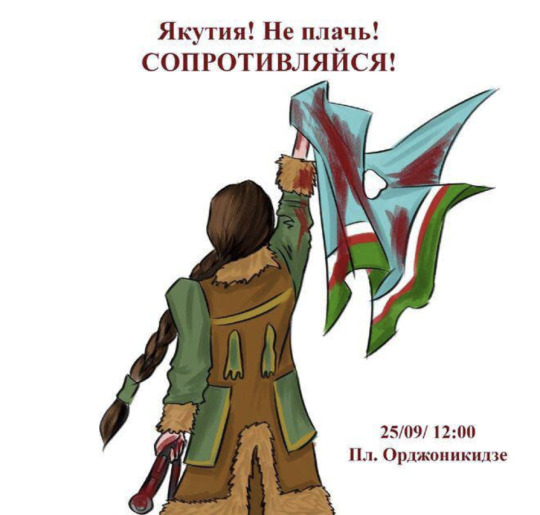
Poster calling for a protest of the Free Yakutia Foundation: "Yakutia! Don't cry! RESIST!"
In Yakutia, women have taken the streets to protest. They stand their ground. And they have done so, shouting "no to genocide!"
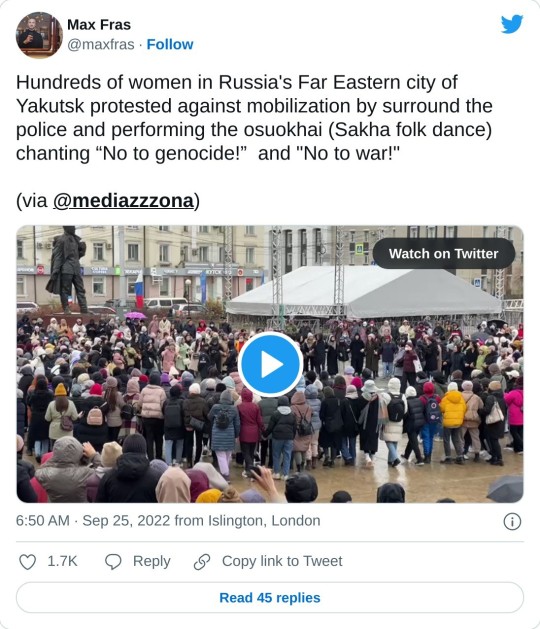
General mobilization in Buryatia
In Buryatia, a republic in the south of Siberia, bordering Mongolia, with a 35% native population of Mongolian origin (Buryats), their situation is just as harsh. "The mobilization in Buryatia is general, not partial", declares Aleksandra Garmazhapova, founder of a local NGO. Viktoriya Maladaeva, coordinator of the Free Buryatia Foundation, confirms it: "They're not calling up only reserves: they mobilize students, disabled people, and people who have never had any relation with the army. In small villages, with only two or three streets, they have taken all the men. There are families where they've called up the fathers and sons." She explains that many men were taken to the recruitment points during the night: "Then people started calling each other, and those who could drove their car to Mongolia. Others have hidden in the forests, in the taiga."
To answer to this situation, the ex-president of Mongolia (2009-2017) Tsakhiagiin Elbegdorj published the following message: "I know that since the beginning of this bloody war, the ethnic minorities that live in Russia are the ones that have suffered the most: the Mongols of Buryatia, of Tuva and Kalmykia have suffered. They have been used as cannon fodder. We, the Mongols, will welcome you with open arms and hearts. Our borders will stay open."
To the question of why she thinks Buryatia is disproportionately affected by the mobilization, Maladaeva answers without a doubt: "Because we are an ethnic minority and for Putin we are worthless [...] And that's the same in other "ethnic republics": right now we're getting calls from activists from Kalmykia, Chuvashia, Yakutia, Tuva... On the contrary, in the Irkutsk region (where there is a Slavic majority without notable minorities), there's silence, even though it borders us. Why?"
Dead in combat
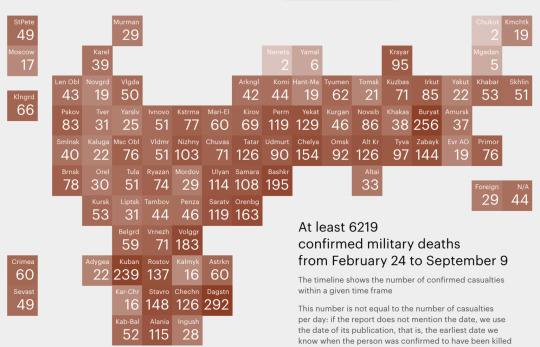
"Russian victims in Ukraine". Data compiled by Mediazona.
We must highlight that, until Putin signed the decree to mobilize reserves last Wednesday, going to fight in Ukraine was voluntary and paid. Those interested signed a contract with the Russian army and got paid a monthly salary between 130,000 and 200,000 rubles, depending on the region.
These salaries might not be much in Moscow, but they are a fortune in the most deprived areas. In the Russian capital city, the average monthly wage is about 115,009 rubles, three times the average monthly wage in Buryatia. If we look at unemployment rates, we see how it's 1.5% in Saint Petersburg while in Northern Caucasus republics, such as Ingushetia, it's as high as 30%. In the context of these economic inequalities, a result of highly centralized policies that center the economic wealth around the cities where political power resides and regulate the periphery to misery, it's no surprise that Buryats and Caucasians see an opportunity in an army wage, and knowing that in the worst of cases, if they die in combat, their families will receive (in theory) a compensation of 7 million rubles and a pension.
These economic reasons explain, in part, why the two regions with the most soldiers who died in combat in Ukraine are Buryatia and Dagestan (in the northern Caucasus). According to official data compiled by the Russian news portal Mediazona, 6,219 Russian soldiers have died in total in the war in Ukraine. From Buryatia, 256 have died (out of a total of 1 million inhabitants), and from Dagestan, 292 (out of 2.5 million inhabitants). These numbers contrast highly with the 17 dead soldiers from Moscow (12 million inhabitants) or the 49 deaths from Saint Petersburg (5 million inhabitants).
"We are the empire's trash"
Another factor that deepens the marginalization of minorities in Russia, that could have contributed to their disproportionate enlistment, is the prevailing racism in Russian society. Maria Viushkova, analyst of the Free Buryatia Foundation, declared in an interview: "The best alternatives in Buryatia for finding a job are either emigrating to South Korea or joining the army. For us, it's difficult to find work in other regions of Russia, where Buryats have to face discrimination and racism: they don't hire them, they don't house them, they limit their education. Often, Buryats who have tried their luck in other regions of Russia are forced to come back."
Aslan is a man from Kabardino-Balkaria, near Dagestan. He confirms that racism towards Caucasians is noticeable in Moscow, where he worked in some years: "It's constant. At work, first they looked badly at me, it took them a while to trust me. And when they knew me well, sometimes they spoke badly of Caucasians using a slur that they use to define us, "chernojopie" (black butts), not even realising I was there. In the subway, I have had problems with nationalists because of my looks. And my child has had quarrels with his friends for not being "Russian".
I ask him why he thinks it's them and Siberian minorities who are the most affected by this war. He's resolute: "Because we are the empire's trash to the Kremlin, and this is a way to get rid of us." And he adds: "But I don't understand why the Northern peoples don't rebel against Moscow, the empire has also wanted to destroy them. I think mobilization hasn't been as numerous in our republics in the Caucasus as it has in the Far East because they don't dare to, they know we'll stand up to them."
Aslan is probably right. The Caucasus is a potentially explosive region, where there was for years a Jihadist armed group made of young radicalized people with no hopes for the future. Authorities are not interested in feeding discontent and rage among these young people.
But in the Far East and in Siberia the situation is different, and the natives make a request of us. When I asked Nikolai, from the village in Yakutia that has been left with no young men, how could we help them, he said: "Please, report about the minority nations. If all men go to war, the genetic reserve of our people will be gone. In 20 years, or 40 years, our language will also go extinct. We will stop existing."
#war in ukraine#ukraine invasion#national minorities#ethnic minorities#russia#racism#yakutia#buryatia#dagestan#siberia#indigenous#evens#yakuts#tuva#kalmykia#kabardino-balkaria#caucasus#stateless nations#💬#genocide
239 notes
·
View notes
Text
Pathologic fans! I am calling on you all for something very important. If you have ever researched or referenced Buryat language or culture for your fanworks, or enjoyed someone else having done so, here is something you can do for the real people.
There’s an organization called Free Buryatia Foundation that is against the war in Ukraine and is currently trying to help draft dodgers escape to Mongolia, since Buryatia is one of the most heavily recruited regions. It’s a very poor part of Russia, and many people go into the army out of necessity. Unfortunately, this has led to the world seeing the Buryat people in a negative light because of the unconscionable acts of some of the members of the army. Help those Buryats who don’t want war and don’t want to be killed far from their home in a useless, stupid imperial land grab!
https://freeburyatia.taplink.ws
170 notes
·
View notes
Note
two interesting things I saw on twitter about Russia and Ukraine
"Retired US general: Ukrainian army could enter Crimea by mid-2023."
"A top Russian economist warns it will “die by winter.”"
thoughts on these two ideas?
I think, if Ukraine continues its military successes and if Russia continues to struggle with holding ground, then Retired Lieutenant General Ben Rhodes is probably not that far off.
I think Inozemtsev's analysis is probably pretty accurate - I'll quote the article below in full:
In the seven months since Russia invaded Ukraine, some have argued that the international sanctions levied against Russia weren’t strong enough as Russians continued to travel, shop, party—and generally lead a normal life.
Now, an action by Russian President Vladimir Putin could be the catalyst that brings the war home to Russians and plunges the economy into real catastrophe.
Last Wednesday, Putin announced a “partial” mobilization—Russia’s first mobilization decree since World War II—ordering 300,000 able-bodied men aged 18 to 30 in the military reserves to fight in Ukraine, sparking widespread protests across the country.
“I consider it necessary to make [this] decision, which is fully appropriate to the threats we face…to protect our motherland…to ensure the safety of our people and people in the liberated territories,” Putin said last week.
In the days that followed, Russian police arrested over 2,300 citizens for protesting, and tens of thousands of Russians have now fled the country to avoid the draft.
Now, Russian economist Vladislav Inozemtsev, the director of Moscow-based think tank the Center for Research on Post-Industrial Studies, is warning that Putin’s mobilization will have “truly catastrophic consequences,” including the death of the Russian economy and the downfall of Putin’s regime.
“The Russian economy is going to die by winter, I wrote in early March. Now I think I was right. The mobilization announced on Sept. 21 was a milestone that really divided Russian history into ‘before’ and ‘after’—an event that began the final countdown of Putin’s era,” the economist wrote on Sunday for Russian publication The Insider.
‘I don’t want to die for someone else’s ambitions’
Putin’s mobilization decree has already proved highly unpopular in Russia, prompting mass rallies and protest actions.
On Monday, a gunman opened fire at a military recruitment office in the Siberian region of Irkutsk, injuring one person. The gunman’s identity and motivation have not been disclosed. In Ryazan, a city 115 miles southeast of Moscow, a man set himself on fire, shouting that he didn’t want to fight in Ukraine. Over the weekend, at least 400 people—mostly women—protested in Yakutsk’s city centre, telling police to “let our children live.”
Several reports from independent media publications and researchers note that the Kremlin is likely aiming to draft over 1.2 million men to fight in Ukraine—four times more than the 300,000 the government says it’s recruiting. The Kremlin’s press secretary Dmitry Peskov has denied this claim.
Police and recruitment officers have also rounded up students, after Putin specifically said that university students studying full-time would not be called up to serve in Ukraine. Meanwhile, antiwar activists have denounced the government for disproportionately sending ethnic minorities from its Siberian and Caucasus regions to fight in Ukraine. Almost half of the male population in Buryatia, an eastern Siberian region colonized by Russia in the 18th century, have been brought to military assembly points from rural villages, according to independent media reports.
“Mobilization is not partial…in Buryatia. Summons come to students, pensioners, fathers of many children, people with disabilities,” Alexandra Garmazhapova, president of the Free Buryatia Foundation, told CNN.
In a move that shows how far the Kremlin is willing to go to ensure its mobilization demands are met, Putin signed an additional law on Saturday that approves jail terms of up to 10 years for those evading military duty and up to 15 years for wartime desertion.
Catastrophic consequences
Prior to Putin’s mobilization decree, Inozemtsev agreed with predictions that Russia’s GDP would drop around 4–5% this year. But now he believes that Russia’s GDP will drop that much in October alone, and the “next months will only consolidate the trend. Now my spring forecast for a 10% fall seems almost too optimistic,” he said.
The Kremlin’s exclusive focus on mobilization and war efforts means that government funds will be directed to these initiatives at the expense of investment in business and the economy, the economist predicts.
Investments in business will begin to decline sharply, and the Moscow Stock Exchange could dip below 1,500 points before year’s end, Inozemtsev wrote.
“And all this doesn’t take into account…the inevitable new wave of [Western] sanctions that will be announced in the near future. We are talking about a much more radical-than-expected displacement of Russia from energy markets and a new wave of restrictions on the supply of critical [imports] for the country,” he said.
The “financial effects of mobilization—in the medium-term—will be significantly greater than the consequences of…the war in Ukraine,” Inozemtsev said.
In Russia’s poorer regions like Buryatia, the economic consequences will be disastrous, as “thousands of families will be left without income, and local medium and small businesses will simply die out,” Inozemtsev wrote.
Russia will also lose at minimum hundreds of thousands of men to the war’s frontline, and 3 to 4 million more will “disappear” from the labor market,” he wrote. In Russia’s wealthier cities like Moscow and St. Petersburg, residents generally have more resources to leave the country. But Inozemtsev predicts that army officers in the next few days will start serving recruitment papers at people’s workplaces, leading many to quit, or simply not show up at their offices, to avoid getting a summons.
“This will be the strongest blow to the economy. Several million people will prefer to quit their jobs so as not to [serve] in the army. Meanwhile in large cities… the loss of even a few employees can cause disproportionate damage to the economy. Russia is the economy of large cities and companies,” he said.
22 notes
·
View notes